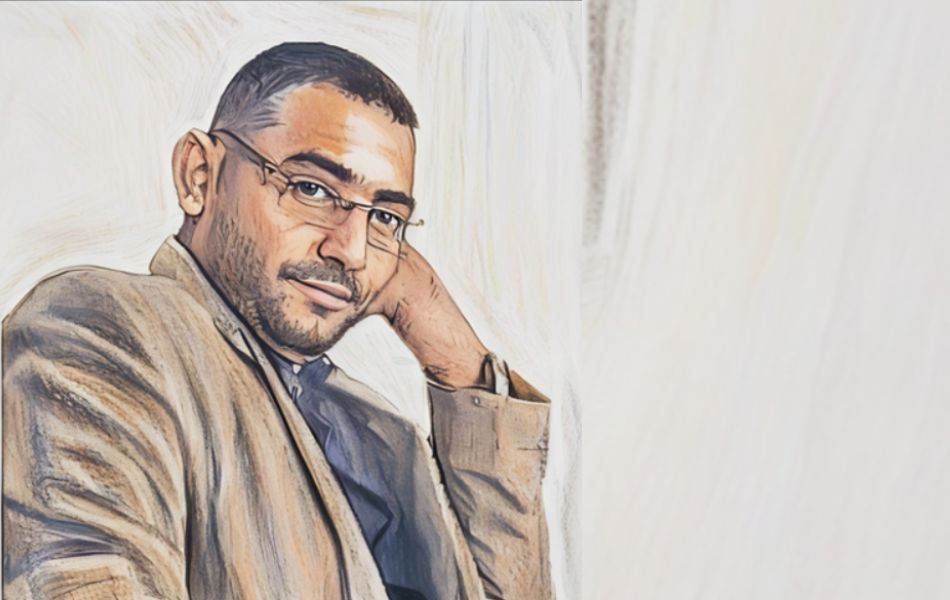
Geneva – SAM Organization for Rights and Liberties stated that it is deeply concerned over the continued prosecution of Yemeni journalist Mohammed Al-Maiahi before the Specialized Criminal Court, emphasizing that the latest court session revealed unacceptable legal violations and practices that constitute a flagrant breach of the fundamental rights guaranteed by Yemeni law and international standards for fair trial.
The organization noted that bringing journalist Mohammed Al-Maiahi to court in shackles and having him stand behind bars, as reported by his lawyer Ammar Ali Yassin, constitutes a violation of his human dignity and a blatant breach of national laws—particularly the Yemeni Criminal Procedure Law, which prohibits degrading treatment and stresses the protection of defendants' rights during trial proceedings.
In a special statement to SAM, attorney Ammar Ali Yassin said that the case against his client is being handled by the State Security Court—a special tribunal that has faced much criticism and growing calls for its abolition, including from the Houthis themselves, who were once among its most vocal opponents.
Yassin emphasized that the charges against Mohammed are primarily linked to his journalistic work, and that the authorities acknowledge he is a journalist. The only dispute leading to the case’s referral to the State Security Court—or the Specialized Criminal Court—was the claim that he cannot be considered a journalist as long as his work is published by parties opposed to the Houthis or by so-called “aggressor countries.”
The lawyer confirmed that they had submitted motions challenging the court’s jurisdiction and the validity of the prosecution's procedures and indictment, arguing that all measures taken prior to the indictment were unlawful and unconstitutional. He cited examples such as the method of arrest, the absence of a judicial search warrant, and the delay in referring him to the prosecutor for more than 24 hours. He also noted that the arresting authority was a newly established body called the “Police Intelligence Service.”
Yassin further explained that Mohammed is a journalist residing in Yemen, and he is aware that the Press Law is still in effect, as are the Press Court and the Press Prosecutor’s Office. He questioned the purpose of establishing these specialized institutions if journalists are still being tried before State Security Courts. He added that the prosecution claims Mohammed’s posts “harm national security and stability, incite violence and hatred, and disturb public order,” classifying these as “crimes against state security.” However, the defense argued that when the Yemeni Press Law was enacted, the legislature explicitly sought to prevent linking journalistic work to state security issues. The law specified which crimes constitute offenses against state security if committed by a journalist—such as inciting violence, terrorism, or harming the head of state—and set a maximum penalty not exceeding one year.
The law, he said, clearly stipulates that a journalist should be tried under the Press Law, before the Press Court, and through the Press Prosecutor, which also outlines the maximum penalties for such publication-related offenses.
Regarding the trial proceedings, the attorney stated that although the prosecution initially ruled itself unqualified to handle the case, it later reversed this decision “due to unknown pressures.” He confirmed that after the case was transferred to the court, they immediately submitted a jurisdictional objection and also demanded the release of Mohammed Al-Maiahi.
Yassin stressed that releasing Mohammed is mandatory under the Press Law, as he has already served more than half of the maximum sentence; he has been imprisoned for eight months, despite the legal maximum of six months for pretrial detention. He noted that the court postponed ruling on the motions and requests pending a response from the prosecution.
He also pointed out that in the most recent session, when Mohammed was confronted with the charges, the prosecution was unable to even comprehend his responses. For example, when asked about his stance toward Ansar Allah or the state, he replied, “I am not interested in any political party or faction engaged in political activity,” which the prosecution misinterpreted as denial of the state’s legitimacy. The defense clarified that the prosecution is incapable of understanding the language of a journalist, and therefore they demanded the case be transferred to the Press Prosecutor, as the current prosecutors “cannot comprehend the meaning and intent behind a journalist’s words or publications.”
SAM also noted that the indictment presented by the prosecution contained vague and unsubstantiated accusations, placing the blame for the country’s economic, social, and political crises on Al-Maiahi’s publications—a precedent that clearly reflects the retaliatory nature of the trial, and the transformation of freedom of expression into a punishable offense, in blatant violation of Article 19 of the International Covenant on Civil and Political Rights, which guarantees the right to freedom of opinion and expression.
The organization emphasized that the conduct of the session, including the performance of the public prosecutor, reveals clear bias and a lack of impartiality, undermining public confidence in the independence of the judiciary and reinforcing the use of the legal system as a tool for settling scores with independent voices.
SAM clarified that referring journalist Al-Maiahi to the Specialized Criminal Court—a special court that lacks basic guarantees of justice—violates Article 10 of the Universal Declaration of Human Rights, which affirms every individual’s right to a fair trial before an independent and impartial tribunal.
SAM calls on the relevant authorities to drop all charges against journalist Mohammed Al-Maiahi, release him immediately and unconditionally, and guarantee his right to be tried before his natural judge, enabling him to defend himself freely and without any pressure or violations.
The organization also urges local and international human rights bodies and journalists’ unions to closely monitor the course of the trial and to intervene urgently to stop the serious violations against press freedom in Yemen. SAM stresses that the right to expression must not become a pretext for imprisoning journalists or branding them as threats to the state and its stability.